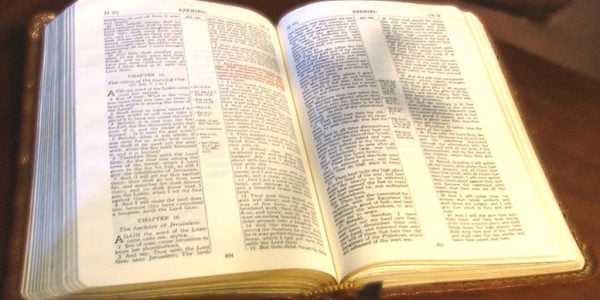
As United Methodism approaches our denominational apocalypse at the May 2020 General Conference, I’ve come across a lot of hand-wringing about our theological identity, namely that we don’t have a clear identity and that’s the whole problem. I understand the angst; Methodism for the next several months will continue to be the largest remaining Protestant mainline denomination that hasn’t split between conservatives and progressives. But this past February, I went on a lay-led Cursillo retreat with a mostly conservative crowd of Louisiana Methodists who convinced me that a simple, practical understanding of Christian salvation as the process of being perfected in love is actually an adequately coherent theological foundation for Wesleyan Christianity.
John Wesley was not a systematic theologian. The only doctrine that can really be attributed to him uniquely is the doctrine of Christian perfection, which holds that the ultimate goal of Christian salvation and discipleship is for Christians to replace the sin in their hearts with perfect love of God and neighbor. Wesley’s primary legacy is the practical means of grace he promoted for Christians to perfect their love. Wesleyan spirituality is the practical holiness of pursuing God’s perfecting love through all the means of grace.
Every Methodist clergy who seeks ordination is asked whether they seek perfection in love and hope to be made perfect in this lifetime. Everyone always says yes of course (with their fingers perhaps visibly or invisibly crossed). And at one time, these scandalous questions were actually taken seriously as our key Wesleyan theological distinction (before the culture wars bifurcated the church into a debate between generic Calvinist evangelical theology and liberal social gospel theology). Of course, the rigid moralistic pietism in some corners of the holiness movement which is part of our Wesleyan legacy took the love out of the perfection, turning it into a miserly fortress of rules prohibiting things like dancing and card games. But when the goal is actually to love perfectly, that’s a very beautiful thing.
Now, it’s of course very important to heavily qualify this with the understanding that pursuing any kind of perfection as our means of self-justification is utterly toxic. We cannot be perfected in love by God if we’re trying to make ourselves perfect, because that means we’re sabotaging God’s love with our need to get credit and be in control. That’s why the justification Jesus offers for our sins on the cross is the prerequisite to the sanctification the Holy Spirit wants to instill in our hearts. We cannot be sanctified by God if we are trying to justify ourselves, any more than a motorcycle could be pedaled by foot like a bicycle at the same time that the motor is spinning the wheel.
I will say that I don’t think justification is a clean, linear process, because I’m still quite a self-sabotaging, self-righteous brat even though Jesus has been trying to prove to me my whole life that I really can lay down my sins at his cross and stop trying to argue that I’m right. But I think that despite the incompleteness of my justification, God has been able to get some work done on my sanctification in the meantime. And I think the sanctification gets easier the more I’ve embraced his justification on my behalf.
In any case, there are a lot of things that matter about Christian theology, but to a Wesleyan, they matter for a specific reason: insofar as they relate to Christians’ ability to be perfected in God’s love. That’s why the meaning of Jesus’ cross and resurrection matters. That’s why biblical teachings matter. That’s why holiness matters. Because God wants to perfect our love, and bad theology can sabotage God’s process (whether the theology is bad because it’s overly compromised by secular thinking or overly pretentious or overly reactive to secular compromise or for a different reason).
Perfection in love should shape how we think about questions of holiness and how we interpret biblical teaching. Sin is that which sabotages God’s perfection of our love. Holiness is that which promotes God’s perfection of our love. If this is indeed our emphasis as Wesleyans, that means that interpreting holiness as authoritarian compliance with opaque biblical legalism (a.k.a. generic evangelical sola scriptura) is alien to actual Wesleyan theology. A Wesleyan theological ethics doesn’t just say these are the rules; I don’t make them or question them. It insists on discerning how various actions impede or enhance the movement of God’s love in our hearts as its principal rubric. We are virtue ethicists, not deontological ones. We believe in the authority of love, not in authority for its own sake.
I’m not so naive to think that understanding our core Wesleyan legacy as the pursuit of perfection in love will suddenly resolve all of our debates. But I do wish that all of us in our various ways would stop trying to prove that we’re something we have never been. Just because the Calvinists build cathedrals out of their dogma doesn’t mean that we have to follow their lead. Just because Karl Barth tells us Christianity is supposed to be strange doesn’t mean that we should be contemptuous of theological sensibilities that seem too pedestrian, straightforward, and practical.
My hope is that after the multiplication of United Methodist has taken place, there will somehow be an expression of Wesleyanism that breaks through the noise and says we just want to love more perfectly and that’s why we pray, sing, preach, study, serve, protest, and chase after Jesus every way we can.
Check out my book How Jesus Saves the World From Us!












